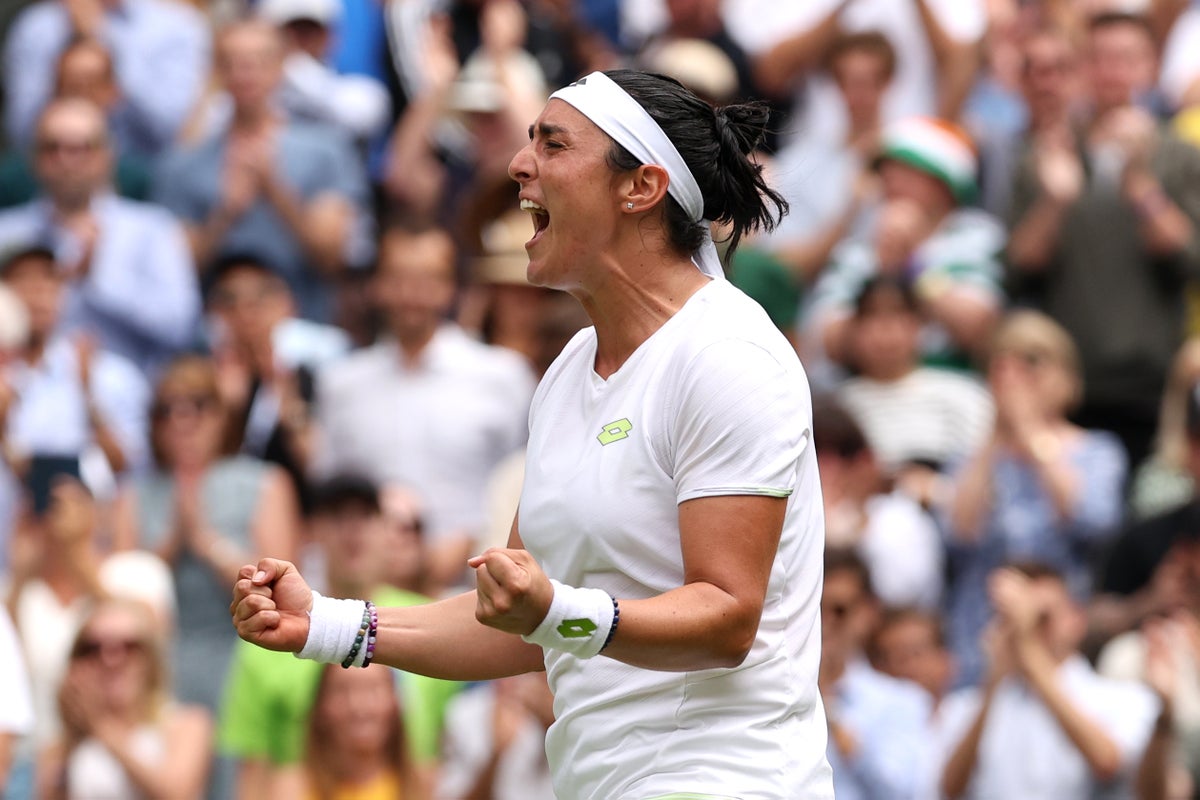
Last year, the emotions were too much for Ons Jabeur. For so long dubbed the woman to bring home Grand Slam glory to a whole continent, the Tunisian’s defeat in the Wimbledon final to Elena Rybakina was too much to take. Just to rub salt in the wounds, the Netflix cameras were present in the warm-up area to see it, as she was consoled by her husband and fitness coach Karim Kamoun.
But revenge is a dish best served cold. A rematch between the pair in the quarter-finals has long been in the pipeline since the draw was first published. Yet on this occasion, back on Centre Court with her emotions again tested after losing a tight first set, Jabeur came out on top in a fashion as bold as it was riveting. Following a 6-7(5), 6-4 6-1 victory, the Wimbledon dream is still alive.
But what swung the match – a toing and froing which saw little to split these grass court connoisseurs – was a game for the ages from Jabeur on her forehand wing. A shot custom to inconsistency, with a slap into the net not unfamiliar, in the end proved her opponent’s undoing when it mattered most.
Rybakina was serving to stay in the second set when Jabeur caressed her first forehand winner of the game down the line. Two more followed – one crosscourt, one inside-in – to bring up two set points and even though Rybakina narrowly missed with a backhand, Jabeur was ready anyway to put away another forehand. When it mattered most, Jabeur grasped the initiative with both hands.
From that moment, roared on by a Centre Court crowd whose allegiance was no secret, Jabeur profiteered on a wave of momentum; a swing in the stakes which could not be reversed as the African hero sealed her place in the semi-finals, where she will face formidable world No 2 Aryna Sabalenka from Belarus.
The one-way nature of the final set was in stark contrast to most of the match. In the opening hour, there was virtually nothing to separate them. After three routine holds of serve, the fourth game of this fifth match between the pair provided the first turning point. On the back foot as a result of the Kazakh’s heavy groundstrokes, Jabeur flimsily folded on serve. Four errors, broken to love.
Yet the Tunisian briskly returned the favour with aplomb. Scurrying to make a terrific forehand pass down the line at 0-30, a booming return kissed the chalk of the baseline and, just like that, we were back on serve.
A dreamlike game from Ons Jabeur on her forehand side swung the match in her favour— (Getty Images)
For both, it was just a blip, as the match evolved into a contest of contrasting on-court styles. Rybakina’s heavy-hitting off both sides at the baseline up against Jabeur’s exemplary court craft and variation. And at 5-5, it was the former which blinked first, with Jabeur’s resilience at the start of the game foiling Rybakina, triggering some uncharacteristic errors.
But much like her opponent earlier in the set, Jabeur let her opportunity slip. A set point was spurned, as the Tunisian allowed Rybakina to dominate the rallies. It set the tone for the tie-break, with Jabeur’s remonstrations with her player box a sign of the times in contrast to Rybakina’s usual cool demeanour. And on her third set point at 6-5 in the breaker, one more booming serve down the T secured the first set. The 24-year-old has won all five tiebreaks she’s had in her Wimbledon career; another indication, if one was needed, of her steely approach.
The pattern for the whole contest was obvious: whoever grasped the initiative early in the rally invariably benefited. The more Jabeur toiled herself in flat groundstroke exchanges, the more it worked against her, with the input of slice a key attribute used throughout the match from the north African.
Both had opportunities to break early in the second but to no avail as the nip and tuck continued. Until 5-4, when that moment arrived.
A spate of forehand winners later and, in a flash, it was one set apiece. Jabeur had the momentum and then a clear spring in her step after a key hold of serve to start the deciding set. The sixth seed was climbing all over the previously indestructible Rybakina serve and immediately broke to love.
Elena Rybakina this time had no answer as Jabeur clinched a three-set win— (Getty Images)
Jabeur celebrates sealing her spot in the semi-finals— (Getty Images)
Jabeur – a two-time major finalist after missing out in last year’s US Open too – was flourishing now, winning one enthralling point with continuous forehand slice-squash shots, pushing her opponent uncomfortably off-balance. Unlike last year’s third set, Jabeur was the player in control. A backhand down the line winner sealed a double break and the inevitable moment of victory followed.
Jabeur slipped her head back and screamed out in celebration, even relief. Some demons had been exorcised. For Rybakina, her aspiration of becoming the first woman since Serena Williams in 2016 to retain the singles title at SW19 had gone. But for Jabeur, desperate to fulfil her hopes and dreams with the weight of Africa on her shoulders, her greatest test yet has been passed with flying colours. Maybe this time is, in fact, her time.







